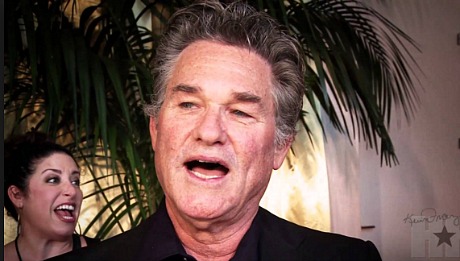Hateful Eight star Kurt Russell and I were having a nice enough interview earlier today, talking not just about Quentin Tarantino‘s soon-to-open film and Russell’s flinty, craggy-voiced performance as a tough-talking bounty hunter named John Ruth, but also, briefly, about a possible film version of Chapman and MacLain Way‘s The Battered Bastards of Baseball.
Released in 2014, Battered Bastards was and is a wonderful doc about a scrappy-ass, mid ’70s minor-league Portland baseball team (called the Mavericks) that was owned and managed by Kurt’s dad, character actor Bing Russell. Russell said that Todd Field might direct with Russell possibly playing his dad…or not. Too early to say but here’s hoping.
 Kurt Russell as snarly-mouthed John Ruth in Quentin Tarantino’s The Hateful Eight.
Kurt Russell as snarly-mouthed John Ruth in Quentin Tarantino’s The Hateful Eight.Then I segued into a riff about how movies tend to reflect the times and the culture they come from. I was thinking that the Quentin Tarantino brand, which has always included a swaggering, half-smirking, bordering-on-flippant use of violence at times, might not fit or reflect the post-Paris, post-San Bernardino culture now as well as it did the all-is-well Clinton ’90s.
I was thinking in particular of a 12.3 N.Y. Times survey piece I read this morning. Written by N.R. Kleinfeld and called “Fear in the Air, Americans Look Over Their Shoulders,” it basically observed that “a creeping fear of being caught in a mass rampage has unmistakably settled itself firmly in the American consciousness.” And I was wondering how that wink-wink grindhouse blood and brutality that colors the second half (and more precisely the final third) of Tarantino’s film is going to synch with that…or not.
Here’s a reasonably close transcript of our gun-and-culture discussion. I guess it wasn’t so much a discussion as a kind of argument, except it was more about Russell arguing with me than vice versa. I played it cool and made my points in a mild-mannered way. Listen and judge for yourself:
Wells: The Quentin cult, if you will, is, like, 23 years old, starting with Reservoir Dogs…right? Violence as attitude, violence as style, violence as fashion…not dealt with in an earnest, realistic way. The swagger thing.
Russell: Right.
Wells: And I was looking in the N.Y. Times this morning and this guy interviewed several people in the country in the Midwest and West. And with almost everybody out there, he reported, there’s a feeling of anxiety in the culture…when’s the next one?
Russell: So how do you connect the dots?
Wells: I think there’s a feeling about shootings and violence right now…I think it’s different in 2015 than it was in the mid ’90s. But Quentin is still playing the same game more or less.
Russell: Well, Quentin does what he does. He’s painting a picture, writing, telling a story…like a filmmaker. But to mix and match reality with fantasy is something I don’t understand but that’s just me. I think we should understand the difference. To mix today’s politics with, in this case, a tale about, uh, a fictional tale about the Civil War…
Wells: I’m not talking about politics. I’m talking about a ground-level, water-table…a feeling in people’s bones. People are genuinely…between Paris and San Bernardino the idea of sudden violence becoming a normal, day-to-day aspect coming from the gun culture and everything else…it’s a different vibe, you know?
Russell: I don’t understand concepts of conversation [about] the gun culture. We’ve lived with guns since, what, the 7th Century or something? I don’t know.
Wells: Well, I think we all know…guns are a trope. Not a trope but a totem, a metaphor that disenfranchised white guys need…it makes them feel good about themselves.
Russell: You can say what you want. I don’t agree with that. It’s not my thing.
Wells: Well, it’s statistically irrefutable.

Russell as he more or less looked during today’s hotel-room interview.
Russell: If you think gun control is going to change the terrorists’ point of view, I think you’re, like, out of your mind. I think anybody [who says that] is. I think it’s absolutely insane. The problem, the problem that we’re having right now to turn it around…you may think you’ve got me worried about you’re gonna do? Dude, you’re about to find out what I’m gonna do, and that’s gonna worry you a lot more. And that‘s what we need. That will change the concept of gun culture, as you call it, to something [like] reality. Which is, if I’m a hockey team and I’ve got some guy bearing down on me as a goal tender, I’m not concerned about what he’s gonna do — I’m gonna make him concerned about what I’m gonna do…
Wells: I get that.
Russell: To stop him. That‘s when things change. [Tries to steer conversation back to the usual-usual, western genre, what Quentin does, asking the question, themes explored.] So what has that got to do with movies? Nothing! Movies are movies. They’re like a painting, like a song, like a book…he’s doing his Quentin Tarantino world, which I think belongs on film. I don’t think it has anything to do with anything outside of film. The music, the manipulation of the screenplay. So I can’t connect the dots. It really is hard for me to connect the dots.
Wells: Obama’s point was that the guys on the no-fly list are [there] for good reason because of terrorist connections or suspicions…they can get hold of a gun pretty easily.
Russell: They can also make a bomb pretty easily. So what? They can also get knives and stab you. Whaddaya gonna do about that? They can also get cars and run you over. Whaddaya gonna do about that?
Wells: They didn’t kill the people in San Bernardino with cars.
Russell: But they’ve killed others that way, haven’t they? Yeah, yeah. Whaddaya gonna do? Outlaw everything? That isn’t the answer.
Wells: Just put some controls…
Russell: Put some controls? What, so the people, so the people who want to defend themselves can’t?
Wells: No, not so you can’t, just so the idiots can’t get hold of them [so easily], that’s all.
Russell: You really believe they’re not going to? Are you serious about that? What good will that…? Oh my God. You and I just disagree.
Wells: Okay.
Russell: You and I just disagree. I understand that you think you can control the behavior of people that are dead set on taking your way of life away from you. You think you can control that? And there’s only one thing you can do with that. And that’s [to say} ‘No, dude, that’s not gonna happen. That’s just not gonna happen.’
I shook Russell’s hand, thanked him, we both chuckled and that was that. He’s a likable straight-shooter if you steer clear of political matters — we just happened to get into it today. Again, the whole interview and just the guns-and-culture part.









